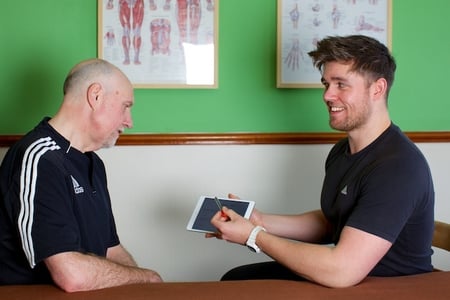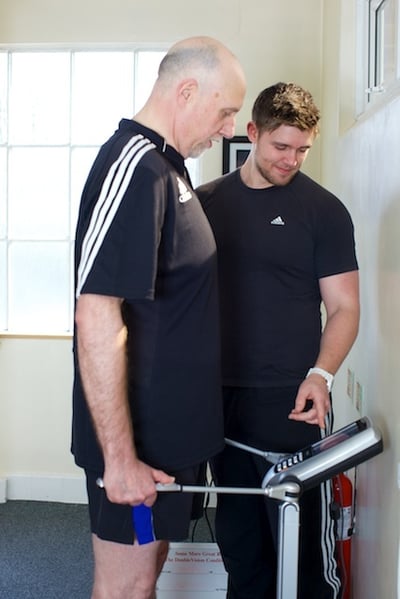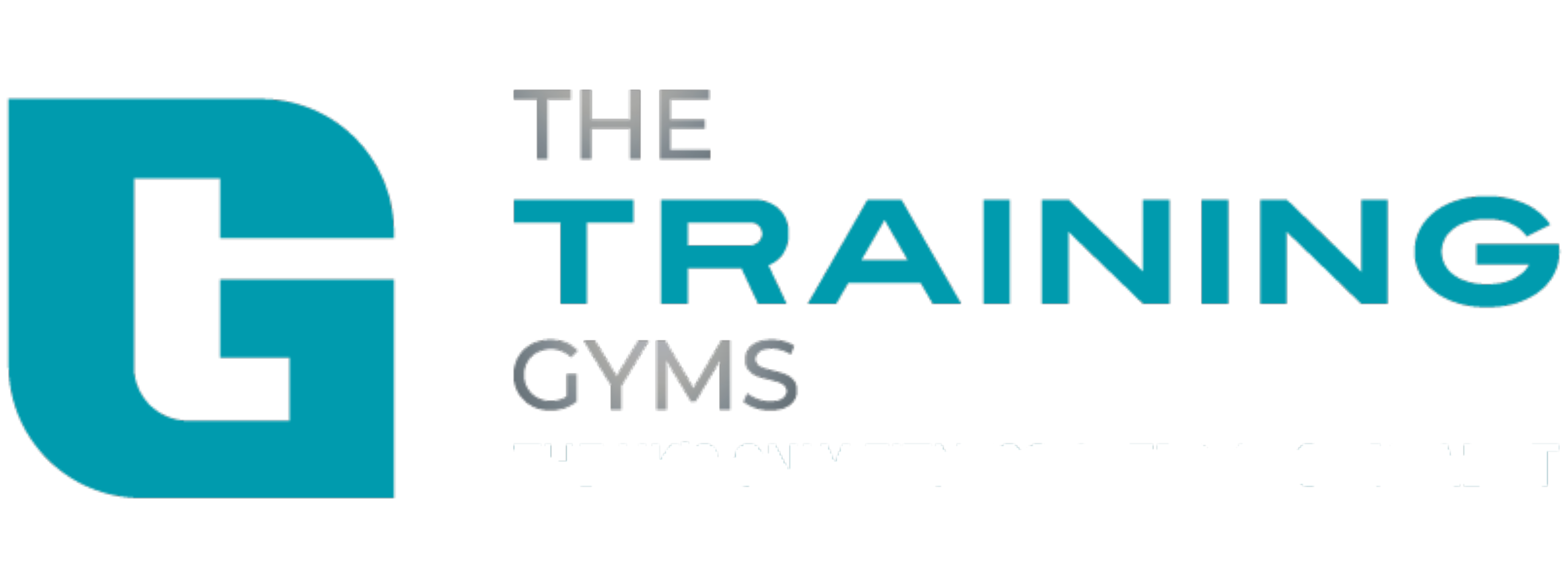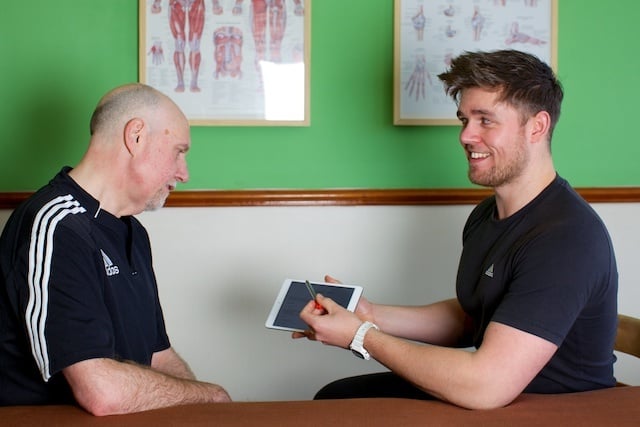Nathan: Hi, I’m Nathan from the DVCC and I'm here with Josh Stapleton today. We’re just going to be discussing the Progress Tracker. Josh, how are you?
Josh: I’m very good thanks, Nathan.
![]() Nathan: Awesome. Can you first of all give me a little bit of background information on what the Progress Tracker is?
Nathan: Awesome. Can you first of all give me a little bit of background information on what the Progress Tracker is?
Josh: The Progress Tracker actually isn’t that old; it was devised a few years ago. The DVCC has been around for over 6 years now and actually when we first started, a lot of the things that we use in our Progress Tracker weren’t around, so we used to measure people at specific points on their body using a tape measure and weigh them using a standard weighing scale.
There was actually a particular story that led to one of the things that we use very often at the DVCC; it is one of our biggest tools that allows us to get the results that we do.
We had a lady come to us; she had just stopped smoking and she’d been training with us for about 30 days; she was absolutely loving it. She said she felt great, she’d made some big changes, nutritionally she was feeling a lot better and she was really excited to get measured. But actually when she stepped onto the weighing scales to get measured, it showed no change and unfortunately she didn’t respond very well to that, which is understandable, and didn’t continue on at the DVCC.
Now, as a lot of you and a lot of the clients at the DVCC now will know, weight is not the whole story of what is going on; she had built muscle tone and lost body fat, which was the reason that her actual weight stayed static.
This led us to do some research into what was the best way to measure body fat and we actually looked into a company called Inbody from America, and had our first Inbody machine sent over. It is a very accurate body fat machine; it cost five thousand pounds and is very highly sought after. Chelsea football club were actually the last people to get one sent over to this country. It is the most accurate measurement you will get outside of professional sports, and that’s how we do all our measurements in our Progress Trackers now.
Nathan: So that’s made a big difference in clients being able to see their results and make sure that they are definitely going in the right direction, even if their weight stays the same.
Would you say that is something you see quite often when you do a Progress Tracker, that somebody’s body composition has changed so they’ve definitely lost fat, but their weight stays very similar for a period of time?
Josh: It does happen quite frequently, especially when people first start training. They won’t have been used to resistance training before, so there is a limited window where they can build muscle tone very, very quickly. The added muscle tone, in the long run, will enable them to lose a lot more body fat quicker. But obviously it means that you are adding muscle tone and losing body fat simultaneously, your weight won’t change that much. So despite the fact that your weight doesn’t change that much, your body composition, which is what we’re after – your body shape – does change a lot more, so that’s more beneficial to the client and it allows us to show our clients how we do that.
Now, one of the recent additions we’ve made to the Progress Tracker is to update some software, so clients can check their results in real time, any time. Every time we do a Progress Tracker with a client, we will update their results and they are able to view that and keep a track of their progress.
Nathan: So that allows them to see their progress at home, which is awesome because you can always know where you’re going and you can set your own goals within that, on Fit Clients, which is a very powerful tool.
Aside from taking measurements, what other areas would a Progress Tracker help somebody with who is trying to lose body fat?
 Josh: The Progress Tracker is essentially a structured one to one meeting where we would track clients’ progress through our many protocols and make any tweaks or adjustments to their nutrition as we need to. We do it between every week and three weeks with all of our clients and take their measurements on our body fat machine.
Josh: The Progress Tracker is essentially a structured one to one meeting where we would track clients’ progress through our many protocols and make any tweaks or adjustments to their nutrition as we need to. We do it between every week and three weeks with all of our clients and take their measurements on our body fat machine.
But there are plenty of other things that we talk about; mindset does play a very important part in fat loss, as does sleep, joint soreness – all of these things which will get discussed in the Progress Tracker and it is just a very good opportunity to meet one to one with our clients and discuss anything that may be going on in their lives and how we could improve their body composition and make them healthier.
Nathan: So with that you are talking about the DVCC focus habits, which is something that has come into play. Would you say in your time at the DVCC – I think you have been here just over 3 years now, correct me if I am wrong – would you say in your time since the Progress Tracker has evolved from where it started, that client results have increased?
Josh: Yes, undeniably so. Now we can actually track it with the software, so it is measurable how much faster results are now.
When I first came to the DVCC, Progress Trackers were far less frequent; we used to catch up and just have an informal chat about how things were going every month. It wasn’t as focused as it is now and obviously didn’t produce as good results as it does now. We do have set outcomes now, so if a client comes to us and their body composition hasn’t changed in the way they’d want it to, then we have a set list of questions that we would go through, which would tell them the smallest habit that they could change that would have the biggest impact on speeding up their metabolism.
Nathan: So they leave with something that they can focus on for the next 7 or 14 days, that is going to be able to help them in the long run, which is awesome.
Tell me a little bit about your knowledge about using callipers. I know a lot of personal trainers in the industry will use callipers, maybe because they can’t get the type of equipment, the Inbody machine that we use at the DVCC. Is that something that you’ve ever used or the DVCC has ever used?
Josh: I have used callipers before in the past; callipers are a good tool when used correctly, but unfortunately they are used incorrectly quite often. Obviously with callipers, there is quite a large element of human error and you’d actually need around 3000 measurements to reduce that error to zero. So it does require a large amount of time and just being measured a lot to get the desired result. Whereas with the Inbody machine, the error is inherently very low and obviously because it is electronic it only takes about 30 seconds to do each reading; that is absolutely fine.
Nathan: It is not very invasive either, because when you take a measurement with callipers, you’re taking points from the body, such as on the thigh and the upper chest, which can be quite daunting for someone to take that part of their clothing off to reveal the place where you need to pinch.
What about the type of body fat measurements you can get, from Boots for example, I think they are called Omerons; they are about £30. Would you say they are as good in terms of measuring your body fat, or would you say they are nowhere near what the Inbody does?
Josh: You are quite right; they are vastly, vastly less accurate. There is actually a good story about someone who came to me about 9 months ago; she was concerned because she had been to a fitness facility and had been measured with one of the devices that you are speaking about and she had come back at just over 30% body fat. She was quite concerned because she had been training very hard and it was a lot higher number than she expected. So she came to me and I measured her on the Inbody machine and she actually came out to be18%, so you can see how big a variation that is.
Nathan: 12% body fat, you’re talking about a big difference.
 Josh: It is very, very significant and the impact that it had on her; she was very fortunate in that she had the Double Vision Conditioning Centre and the Inbody machine to verify that the results weren’t accurate on the other machine. But it did still have an effect on her mindset and obviously wasn’t a very nice thing to hear; so I would say avoid using those instruments if possible.
Josh: It is very, very significant and the impact that it had on her; she was very fortunate in that she had the Double Vision Conditioning Centre and the Inbody machine to verify that the results weren’t accurate on the other machine. But it did still have an effect on her mindset and obviously wasn’t a very nice thing to hear; so I would say avoid using those instruments if possible.
Nathan: You will know just as well as I do that fat loss is never linear so it never comes straight down. Would you say the Progress Tracker is helpful in the sense that if you do have a blip or you do come up, it’s going to put you right back in the track to know that you are going to continue to lose weight?
Josh: Yes, in my 3.5 years at the DVCC I have never, ever come across a client who has lost body fat consistently for a period of 12 months. There will be times – maybe it’s a holiday, maybe it’s a birthday, maybe it’s Christmas – there are times when your body fat plateaus or maybe even goes up; that is just the way things go.
But the Progress Tracker is not there to judge your food or to tell you off when you have done something that you might not have been meant to; it is there to remind you of the good habits that you have already had in place that will get you to your ultimate goal. So it is just there to remind you and the good thing is that if you track something it will improve.
The only bad thing would be if you were to ignore and not book in a Progress Tracker; you will have no idea where you are at and you might be feeling guilty about things you’ve eaten. It is always better to know where you’re at.
Nathan: Of course, because you know if you were to avoid having a Progress Tracker or some kind of measurement, say after coming back from holiday where you feel like your body fat might have increased, and then you train hard for four weeks and then have a Progress Tracker and you’re still in the same place as you were before your holiday, you might feel thrown off training because you haven’t made any progress. But what you probably would have seen if you’d had that Progress Tracker as you’d come up after that holiday, and then come back down.
Josh: 100% - and it’s happened in quite a number of situations. So one thing we always try and do here now is to get clients booked in for a Progress Tracker as soon as possible after they come back from a holiday. Often it can be a bit of a daunting prospect to get booked in and see what’s happened after a holiday, but with the focus habit software I have found that a lot of clients actually don’t put on very much body fat and in some cases I have seen clients lose body fat after being on holiday. Because the power of habits is that you can do them anywhere and any time; it’s not like a diet where you’re either on it or you’re off it; habits stick with you.
Nathan: And that’s the thing that causes long term change.
Josh: Exactly.
Nathan: Ok Josh – just to recap, can you just give me an overview of the Progress Tracker that we do at the DVCC?
Josh: A Progress Tracker is something that we do with all of our clients between every week and three weeks, where we will track their progress on our special Inbody machine, which very, very accurately measures a few values: their body fat, their weight and other things if they wanted to know it, such as where they store their body fat and where they store their muscle tone.
Then, if their progress wasn’t in the right direction, we do have software which would be able to send them one habit that would speed up their metabolism to enable them to make the progress that they want to make towards their goals, and that would get emailed to them.
Nathan: Awesome. Josh, it’s been a pleasure speaking to you today, thank you very much.
Josh: You too, Nathan.
Nathan: If you’ve been listening to this Podcast I hope you’ve enjoyed it. If you have got any questions or if you’d like any feedback, please leave them in the comments section below - and have a very good day.









